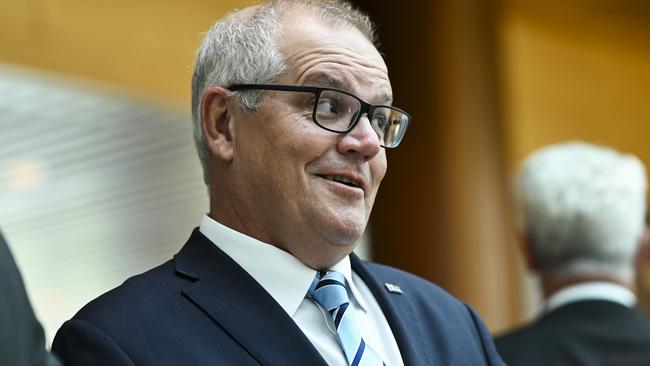Study shows shock shift among young voters
Millennials and Gen Z have abandoned the Coalition in a historic shift, as voters label Scott Morrison the least popular pollie of all time.
Federal Election
Don't miss out on the headlines from Federal Election. Followed categories will be added to My News.
Millennials and Gen Z deserted the Coalition in droves at the 2022 election, opening up a major opportunity for minor parties to foster lifelong loyalty among what will soon become Australia’s largest voting base.
Support for the Coalition is at historic lows among younger people, according to the nation’s largest and longest-running study of political beliefs, painting a dire picture for the Liberals and Nationals.
The latest Australian Election Study data, released on Monday, showed a shocking year for the Coalition, with its vote share falling in almost every group. Its standing among young voters fell historically.
Only about one-in-four people under 40 reported voting for the Coalition in May. At no time in the study’s history has there been such dismal support for a major party among a large voting group.
“At no time in the 35-year history of the AES have we observed such a low level of support for either major party in so large a segment of the electorate,” the report said.
“By contrast, support for Labor remained virtually unchanged from 2019 to 2022, with about 38 per cent of voters under the age of 40 supporting Labor.”

The Australian National University-led study concluded: “How the Coalition addresses this overwhelming deficit of support among younger generations is perhaps the single biggest question confronting Australian politics.”
The data indicates a major opportunity for minor parties to nab lifelong loyalty. Aussie voters don’t tend to drift dramatically to the right as they age, but rather show huge support for the parties that recruited them when they were young.
“Voters are now less rusted on to the major parties and are becoming more independently minded in their political choices,” study co-author Ian McAllister said.
Gen Z, born after 1996, voted in droves only at the 2019 and 2022 elections. In that time, just 26 per cent reported voting for the Coalition, compared to 67 per cent for either the Greens or Labor.
No other generation has recorded such lopsided preferences at a similar life stage.
Scott Morrison, meanwhile, emerged as the least popular major party leader ever. The former prime minister nabbed a likability score of just 3.8 points out of 10, the lowest in the 35-year history of the AES.

Anthony Albanese, on the other hand, was recorded as the most popular major party leader since Kevin Rudd at the height of his popularity in 2007.
The study showed a “large-scale abandonment” of major parties in general, Professor McAllister said.
Almost one-in-three voters cast their ballot for a minor party or independent candidate in 2022 – the highest number in almost 100 years.
The shift primarily benefited independent candidates and the Greens, he said, adding: “Support for the independents and minor parties will only continue to grow.”
Fellow co-author Sarah Cameron praised the political campaigns of the so-called Teal Independents.
“The Teals ran well-funded, well-organised campaigns that were widely covered in the media,” Dr Cameron said.
“These campaigns tapped into frustrations with the incumbent Coalition government on issues where they were perceived as weak.”
Most Teal voters weren’t “disaffected Liberals”, Dr Cameron said, but rather tactical Labor and Greens voters seeking action on climate and integrity.
Originally published as Study shows shock shift among young voters





